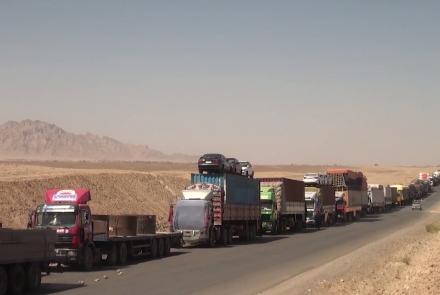The closure of the Abu Nasr Farahi port in the west of Afghanistan – in the border with Iran – has affected business in local markets and has stopped goods worth millions of dollars in the province.
The Ministry of Finance has not commented on its decision to ban the import of fuel, cement, iron products and ceramics through Farah’s Abu Nasr Farahi port on September 16.
Investors said the customs department of the port was first transferred to a distance of 70 kilometers from the port but it faced more corruption in its new place. Following this, the investors said the ministry decided to ban import of key goods from the port.
“Security is a serious problem there (at the port). Eighty percent of this area and its customs and the route are under militants control and the militants are taking money and taxes from us (traders),” said Khan Jan Alokozai, the deputy head of Afghanistan Chamber of Commerce and Industries.
So far, many protests have been held in Farah against the Finance Ministry’s decision.
Some drivers from Farah said they are spending days and nights under a harsh weather over the past five days.
“Actually, we have no idea that why the road is closed? Neither government nor the people are asking about this,” said Jalil Ahmad, a driver.
“Open the route. Your problem is with government. What is the sin of drivers? We have spent nights on dust,” said Fazl Ahmad, a driver.
One member of Farah Provincial Council said the ban on the imports has resulted in an increase in goods prices in the local market and has affected employment in the province.
“One and a half million people who were fed through working in the port have lost their incomes,” said Dadullah Qane, member of Farah Provincial Council.
“They (investors and workers) have no option except picking guns. We want our rights. This is our right and we want it,” said Bismillah, an investor at Abu Nasr Farahi port.


